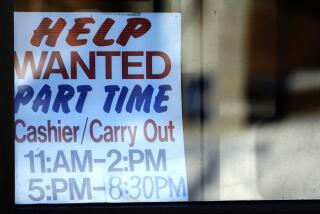Small Businesses Finding It Difficult to Hire Qualified Workers
- Share via
The economic slowdown means the labor market isn’t as tight as it was a year ago, but small-business owners are still reporting a good man or woman is hard to find.
A nationwide survey of businesses that employ fewer than 250 workers found during the spring 71% of firms that recently recruited employees said it was “hard” or “very hard” to find qualified workers.
The survey, conducted by the Gallup Organization for the National Federation of Independent Business, found about 30% of the companies looking for workers still must outbid other employers by offering higher wages or better benefits.
Two-thirds of the firms said they have gone without needed employees. More than half said they’ve had to cut back work hours, limit production or turn away business.
“If we had a more skilled work force and just more bodies, we’d have more output, no ifs, ands or buts about it,” William J. Dennis Jr., senior research fellow at the NFIB, said last month. “When firms need to limit work, we suffer a loss of output, and that means everyone suffers.”
The survey interviews of more than 750 small businesses nationwide were conducted in April and May. Although economic markets have deteriorated in the last three months, an NFIB spokesman said the results are consistent with what the organization has been hearing from its members more recently.
For some businesses, recruiting workers remains a near-constant task, said Bern Bonifant, vice president of Natural Lawns Inc., a residential lawn-care company based in a Washington suburb that employs 45 people. The pay scale there starts at $9.10 an hour and rises with experience, he said, and includes health benefits for those who earn state certification.
He said he’s always on the lookout for workers who speak and read English well enough to pass state tests that permit them to use pesticides and who understand math well enough to calculate the amount of lawn chemicals.
“Some individuals just can’t master it,” Bonifant said. “Most companies are doing all they can to hold on to their best employees.” Of a dozen workers Bonifant has hired recently, only two were already fully qualified. After several weeks of training, when outdoor temperatures hit 95 degrees for several days in a row, three of the others quit. “It only takes two weeks of heat and people say, ‘I want to be a bank teller,’ ” Bonifant said.
Some employers told the survey researchers the softening market means they’re able to be “more selective” in hiring than they were last year. Almost half said they boosted their required skill level. About one-third said they had higher standards for “personal conduct and attitude.”
The survey found much of the churning in the technology sector seems to be bypassing more traditional small business. More than 90% of those surveyed reported little or no worker turnover. About 61% said no workers have left their firms, voluntarily or involuntarily, since the beginning of the year.
Maria Threadgill, operations manager at James River Grounds Management Inc., which does landscaping for large hotels, shopping centers and hospitals in Virginia, said the firm continues to have trouble recruiting workers. A recent job posting at the Virginia Employment Commission for a landscaping crew member at $6.70 an hour drew only one inquiry, she said. The company sent the prospective applicant a certified letter offering him the job but got no response.
Threadgill said the firm has turned to recruiting immigrant workers from Mexico and South Africa through a federal visa program that creates a new set of complications, from added paperwork to finding housing and transportation.
Other small employers she knows are using prison work-release programs to find workers, Threadgill said.
More to Read
Inside the business of entertainment
The Wide Shot brings you news, analysis and insights on everything from streaming wars to production — and what it all means for the future.
You may occasionally receive promotional content from the Los Angeles Times.










